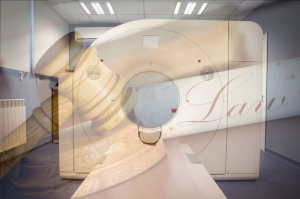by
John R. Fischer, Senior Reporter | August 03, 2018
An MR scan for as low as $500 would be a dream for many patients. Dr. Gajendra Singh, a surgeon based in Winston-Salem, North Carolina, set out to make that dream a reality last August when he set up his own imaging center.
Immediately, he encountered trouble in the form of North Carolina’s Certificate of Need (CON) law, which prohibits him from purchasing his own MR system and has forced him to rely on the assistance of a mobile rental unit, costing him more than a permanent machine would, and leaving his office without the ability to perform MR scans five days a week.
This week, Singh had enough, filing a lawsuit Monday in North Carolina Superior Court to overturn the law.



Ad Statistics
Times Displayed: 173485
Times Visited: 3165 For those who need to move fast and expand clinical capabilities -- and would love new equipment -- the uCT 550 Advance offers a new fully configured 80-slice CT in up to 2 weeks with routine maintenance and parts and Software Upgrades for Life™ included.
“CON laws require government permission in order to offer a new medical service or buy new equipment such as an MR scanner,” Renée Flaherty, an attorney at the Institute of Justice and the lead lawyer for Singh in his case, told HCB News. “The process to obtain a CON is extremely expensive and burdensome. In North Carolina, it can cost up to half a million dollars and take years to get through the process. Smaller medical providers simply can't afford to fight for a CON, but big hospitals can.”
Only 14 of 49 states that retained CON laws at one time have rescinded them in the last 40 years on the basis that they only serve to protect hospitals from competition. In North Carolina, state officials decide each year if different places require certain services. If it is decided that an area does not need a specific service, then providers seeking a CON are barred from applying for even a permit.
This was the case for Singh, who argues that along with expenses of applying for CONs, the use of this law creates monopolies dominated by big providers that restrict the ability of others to compete in the market and raise the costs for exams to levels that are unaffordable for many, preventing access to quality care.
The cost of applying for and defending a CON, according to his legal team, can reach up to $400,000, with the process lasting as long as three years. Purchasing a permanent MR scanner, in contrast, would cost Singh less than $750,000. Further challenging him are contestations of his application by other providers in his area.
Singh, who specializes in liver transplant and gastrointestinal cancer has, as a result, been forced to regularly turn away patients, some of which are in immediate need for MR scans.
His legal team argues that such an action is proof that the law violates his equal protection rights as well as his right to earn a living as guaranteed by the state constitution, which also bans monopolies.
They believe the court will find in favor of them due to its ruling in 1973 on a prior version of the law, which it found unconstitutional, in a case brought by Aston Park Hospital Inc. The North Carolina legislature later passed a modified version of the law.
“We are very confident that the North Carolina Supreme Court will overturn the state's CON law,” said Flaherty. “That is because the court overturned the state's previous CON law for the same reasons we are challenging today's law. The North Carolina Constitution makes monopolies illegal, and the CON law is nothing but a monopoly meant to protect existing medical providers from competition.”
Singh currently performs MR exams using his rental unit for between $500 and $700, doing so under a legal loophole.
In addition, he also offers X-rays for $70; ultrasounds for $200 or $250; and echocardiograms for $300. He started out with cash-only patients but has since begun accepting most types of insurance.

